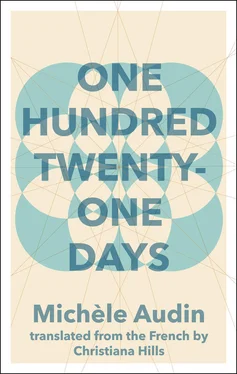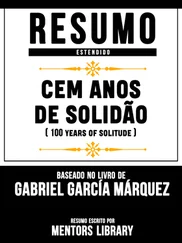Tuesday, March 7
Lots of snow fell again during the night. I had a really hard time getting to the hospital. How can one not picture the shroud that must be covering the battlefields? But can the snow’s whiteness mask such horrors?
Wednesday, March 15
Father de La Martinière told me that I should pray for a Jew’s soul, and so I now include Robert (that is, the polytechnician) in my evening prayers. He’s going to leave the hospital soon, and so I’m spending as much time with him as I can. How wonderful it would be to win over this soul to the true religion!
“Mademoiselle Marguerite, give me a number please!” he shouts out as soon as he sees me enter the room. I say a random answer, but he claims I always give him the same one. “No, not 11, you already gave me that one yesterday,” he tells me, so I say another number, 6. “Thank you,” he responds and starts calculating again. “It’s just that I’m solving equations, Mademoiselle Marguerite,” he says.
This morning, I asked him if he believed in heaven, and, with his eyes shining their brightest, he looked at me and said:
Then hell was silent.
Three injured men in the unit died today, almost at the same time.
October 4, 1916
When I was leaving the hospital this evening to go home, Major de Brisson held me back and asked if I would agree to change units — he said they need me in facial surgery. The major was a friend of Papa’s at boarding school, and he still comes to the house often, so I couldn’t refuse. He wants me to start tomorrow.
Maybe, in this unit, I won’t have any more time to think about Robert. That’s my hope as I start writing in this notebook again today. It will be no more time than I spent telling Mama about it, no more than I spent telling the priest about it, because there was nothing to confess, it seemed, and I just couldn’t write in here about what happened the day he left. Only the thought of Mama kept me from asking to be moved to a hospital at the front.
Sunday the 8th
I haven’t been able to write since last Thursday. As I was leaving mass this morning, I decided to force myself to. But how can I put down on paper what I do, what we do in this unit? Opening up their skulls, trepanning under chloroform — you have to approach it like it’s nothing. Nothing compared to changing the dressings, discovering the bruised flesh, the empty eye sockets, the… I can’t even finish my sentence. Lord, give me strength. They’ve suffered terrible injuries at such a young age, and now they’re disfigured for life. That’s what I said to Mama and Thérèse. I know Thérèse tries to imagine what’s under the bandages, but I know she can’t. You have to see it to believe it.
The hardest thing in this unit is when I have to tell them they’re free from harm. Not getting flustered when I say things like “You’re safe,” or “You made it through.” Afterwards, they ask me what’s under the bandages, what they look like, if they’re very disfigured. I promised to show two men their faces tomorrow morning, I’ll let them borrow the mirror from my handbag. There’s a third one recovering who is disfigured, but blind — at least he won’t have to see his “broken face.” It’s late, I have to stop writing and seek a little strength in prayer.
Hail Mary, full of grace.
October 16, 1916
I am the bearer of bad news. I force myself to smile. They look at themselves in the mirror and they cry. One tried not to cry and started gallantly singing:
Farewell to life, farewell to love,
Farewell to all the girls,
but he burst into tears. I know this song, it continues with:
’Cause we’ve all been sentenced to die,
We’re the ones being sacrificed.
How can you accept not being able to recognize your own face? The worst thing is that most of them refuse the comfort of religion. They prefer to spend their time hiding away with bottles of alcohol. How those got here, I don’t know.
October 18
And they continue to suffer. By the time they get here from the front, their jawbones have started to grow back together, but so poorly that many have difficulty eating. For some, it even hurts to speak.
October 23, 1916
Mama and Thérèse left last Friday to spend a few days at our house in Normandy; they brought enough material to knit blankets for our poor heroes who are starting to get cold again, especially in the mud. It’s the start of the third winter of war.
As I’m alone at home, I worked on Saturday and Sunday (I even heard mass with the men), and I’m getting home later in the evenings.
Today, while bringing medicine to one of our patients, I heard the young man in the next bed over breathing strangely. This patient’s face is so badly damaged that he can only breathe through his mouth. I quickly understood at that point that he could no longer breathe at all. The cause was a hemorrhage that was filling his throat with blood. I lifted up his head and drew out as much blood as I could with a syringe.
Then I ran to find Doctor Debalme, who arrived a few minutes later. He wasn’t pleased that I hadn’t called him first; he told me rather firmly that I was only a nurse and it wasn’t up to me to decide if blood needs to be drawn out, since it’s a medical procedure.
October 24, 1916
Major de Brisson called me in this morning and congratulated me on saving the life of the young man with the hemorrhage. He said, “Marguerite, you saved him and you did well. Doctor Debalme would have arrived too late.”
The patient is an artillery lieutenant. He was really unlucky — it’s rare for an artilleryman to be wounded in the face. The majority of those whom we treat here served in the infantry, they’re the ones who charge out of the trenches and take the most hits.
Tuesday the 31st
This morning, I again had to show a truly disfigured young man his new face. He’s the one who had the hemorrhage last week. He still has his left eye, his left check, and a bit — a tiny bit — of his left jaw, his forehead, and his chin. There’s a big lock of hair on his right temple that is growing back red, like an extra scar in his brown hair. A single bullet managed to do all this damage. But it must be said that it was practically shot point blank.
He’s the first of my patients who didn’t cry at seeing his destroyed face. But he is very young, still a student.
I don’t dare write anything about him because he is a polytechnician like Robert. There has already been another mathematician in the unit. That one left blind a week ago; he told me he was going to do a dissertation on geometry. I thought of Robert. I wonder what he’s doing now; maybe he’s still in the infernal trenches. I continue mentioning him in my evening prayers.
We have taken back Douaumont.
My cousin Jacques was killed in Verdun.
We have never done so many operations in the unit as we did today.
November 8, 1916
This morning, I was taking off the polytechnician’s dressings so that he can undergo a bone graft (he already had a xenograft when he arrived; today they’re trying an autograft, using a fragment from one of his tibias), when he recited the following to me:
You’ll be a Man, my son!
He added that he really liked Kipling. I think I smiled, and then answered:
But I do not tremble in seeing my weakness.
He recognized it as one of Papa’s verses and said he really liked the poetry of Albert Janvier. I felt myself blush and said that the poet Albert Janvier was my father. Then I told him about how Papa died, the railroad accident, but I couldn’t talk for very long — they were taking him to the operating room and other unfortunate men were awaiting treatment.
Читать дальше












